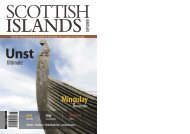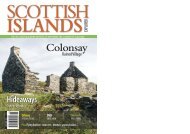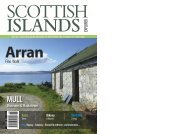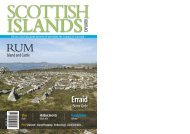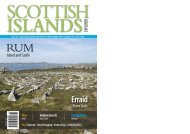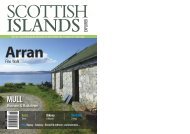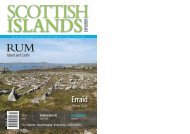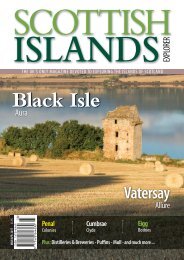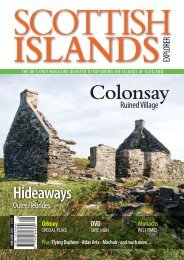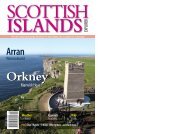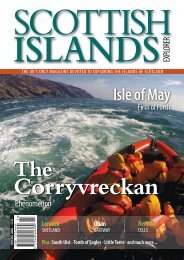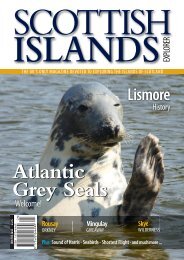You also want an ePaper? Increase the reach of your titles
YUMPU automatically turns print PDFs into web optimized ePapers that Google loves.
Skye Excites the Emotions<br />
Skye Excites the Emotions<br />
Skye Excites the Emotions<br />
Ron Hill shows how past events can add to our experience<br />
Psycho-geography is a fuzzy concept, but I like<br />
using the term to connect places to emotions<br />
and behaviours. In the Braes area on Skye I have<br />
discovered a range of emotions associated with the<br />
physical landscape, the remains of shielings on Ben<br />
Lee, 19th Century croft houses and, importantly, the<br />
monument on the roadside on the approach to<br />
Gedintailor which records an event on Tuesday, 18<br />
April 1882.<br />
On moving to Camustianavaig, in The Braes area<br />
near Portree, Skye, I discovered that as well as the<br />
house and the grounds, there was a book which<br />
came with the new ownership. The book is The<br />
Former Days by Norman Maclean, published in<br />
1945. It is based on personal reminiscences from<br />
living in the vicinity and includes the events which<br />
became known as ‘The Battle of the Braes.’<br />
Maclean describes the scene on that day when a<br />
force of 50 policemen (including 40 drafted from<br />
Glasgow) marched the seven miles from Portree to<br />
Balmeanach in Braes to arrest the lawbreakers - that<br />
is those men who broke the law on 7 April 1882<br />
when an attempt to evict seven men and three<br />
women from the Braes for grazing on Ben Lee<br />
without permission was de-forced.<br />
Public Embarrassment<br />
This was when a local crowd burnt the summonses,<br />
with public embarrassment for the Sherriff Officer,<br />
his assistant and the Estate Ground Officer. Maclean<br />
tells us it was a ‘grey dawn’ with poor weather<br />
conditions. He wrote, ‘Nobody could have wished a<br />
more forbidding reception on the part of the<br />
elements. The rain swept down Glen Varagil in sheets<br />
driven by a south-wester that blew with ice in its<br />
teeth. No greatcoats could stand up to rain driven by<br />
such a wind’<br />
We must also picture a wagonette rumbling<br />
behind the marching policemen including Sherriff<br />
Ivory (Sherriff of the County of Inverness-shire),<br />
Sherriff-Substitute Spiers (who administered the<br />
law on the Isle of Skye), and other local officials.<br />
Roger Hutchinson adds in his Martyrs: Glendale<br />
and the Revolution on Skye ‘…and several journalists<br />
set forth from Portree.’<br />
The 1880s was an age of mass communications and<br />
by 1881, 18 daily newspapers were appearing in<br />
London, 96 in the English provinces, 21 in Scotland<br />
and 17 in Ireland, (but only four in Wales) according<br />
to Kevin Williams in his Read All About It: A History<br />
of the British Newspaper. The actual ‘battle’ took place<br />
when the police arrested the five law-breakers which<br />
sparked a reaction from the Braes communities.<br />
Sharp Flints<br />
Maclean, in his romantic style, imagined the 15<br />
minute ‘battle’ as ‘When the invaders reached the<br />
south end of the pass, they were met with a fusillade<br />
of stones and clods. Sam (Nicolson) had some 20<br />
boys and girls under his command. They filled their<br />
pockets with sharp flints. ‘They have no guns’, cried<br />
Sam, ‘Let us charge them; throw stones and then<br />
run back up the brae’.<br />
This they did, hurling down the slope like a<br />
mountain torrent. Stopping where Sam stopped, a<br />
rain of stones descended on the police. Sherriff<br />
Ivory, the sacred representative of Queen Victoria,<br />
the embodiment of law and order, was hit with a<br />
clod on the jaw. For Sam never missed his target’.<br />
The Glasgow Evening Times of 21 April 1882<br />
reported, under the banner heading of ‘Return of<br />
the Glasgow Police’ - ‘The policemen arrived in<br />
Glasgow this forenoon and with a few exceptions<br />
have reported themselves for duty in the various<br />
districts from which they were drawn. They all bear<br />
traces of fatigue and exposure.’<br />
The Unhappy Crofters<br />
‘Telegraphing last night from Portree the special<br />
correspondent of The Herald says, the sudden and<br />
effective, if somewhat harsh, blows inflicted<br />
yesterday by the constabulary of Glasgow and<br />
Inverness on the unhappy crofters at the Braes have<br />
had a wonderful influence on restoring order.’<br />
Further in the same report, from the journalist<br />
who was in the Braes area on the day after the<br />
40 SCOTTISH ISLANDS EXPLORER MAY / JUNE <strong>2017</strong><br />
MAY / JUNE <strong>2017</strong> SCOTTISH ISLANDS EXPLORER 41



